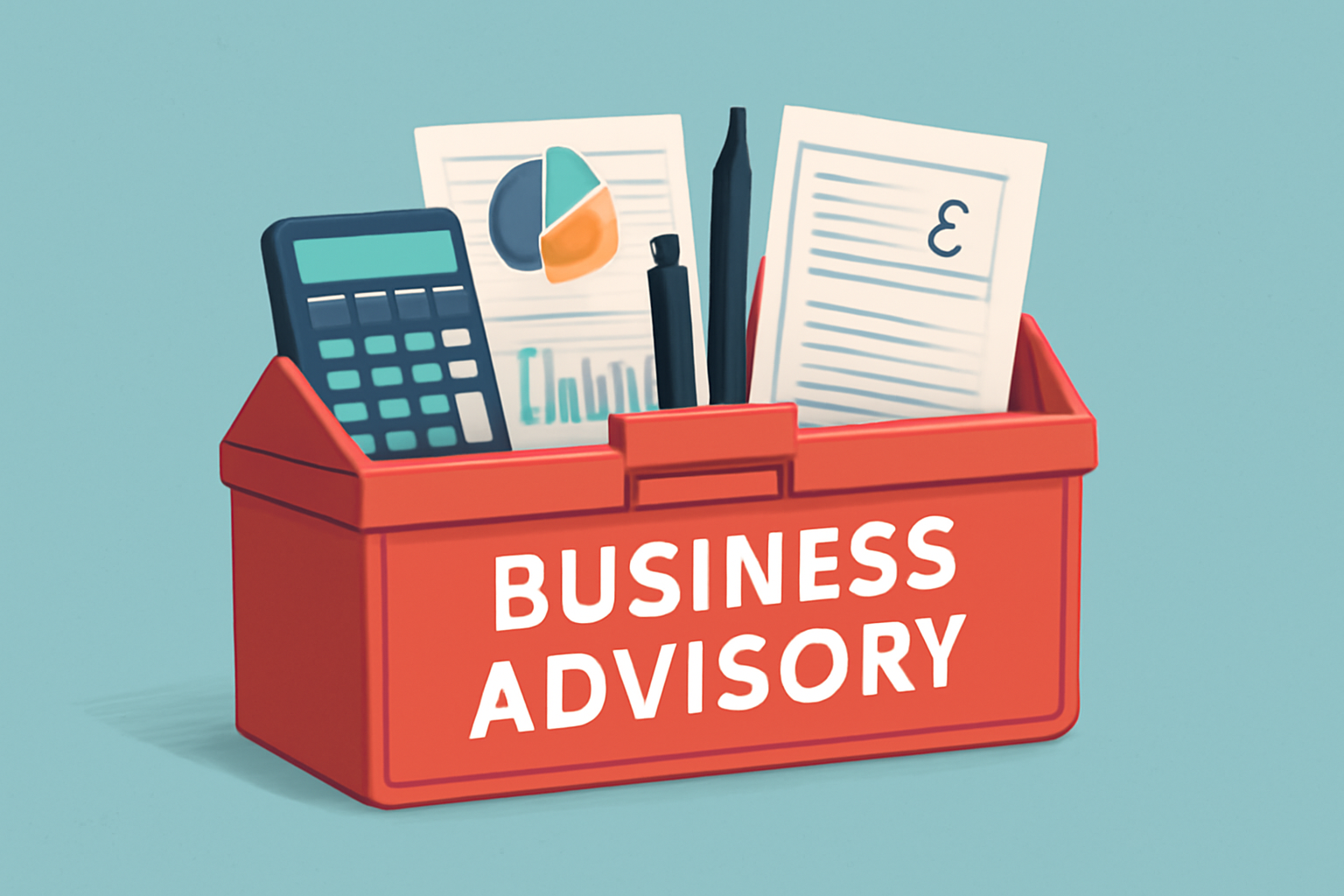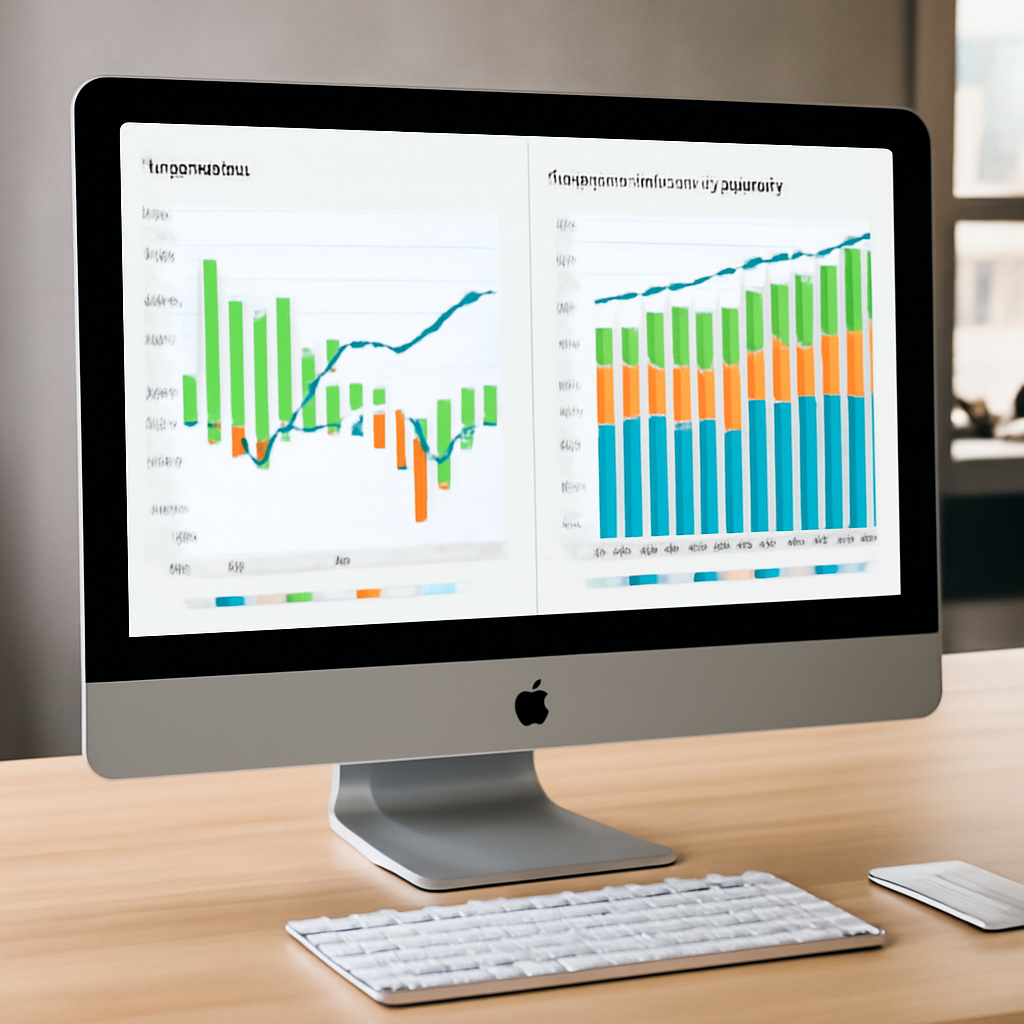
Most small business owners treat their accountant like a reluctant dentist appointment – necessary, slightly uncomfortable, and mercifully brief. You hand over a shoebox of receipts in March, get your tax return sorted, and retreat for another year. But here’s the thing that keeps me awake at night: you’re missing the entire point.
A business advisory accountant isn’t just someone who makes your tax headache disappear. They’re the difference between a business that limps along and one that actually thrives. I’ve watched too many brilliant entrepreneurs stumble simply because they thought accounting was about compliance rather than strategy.
The Great Accounting Misconception (And Why It’s Costing You)
Picture this: Steve runs a boutique marketing agency in South London. Talented team, loyal clients, decent turnover. But every month feels like financial Russian roulette. Cash flow dries up without warning. Profitable projects somehow leave her skint. He’s working 70-hour weeks but can’t figure out why her bank balance looks anaemic.

Steve’s problem? he treated her accountant like a historian instead of a fortune teller.
Traditional accounting tells you what happened. Business advisory accounting tells you what’s about to happen – and more importantly, what you can do about it. The distinction matters more than you might think.
What Makes Advisory Different?
| Traditional Accounting | Business Advisory Accounting |
| Backward-looking reports | Forward-thinking strategy |
| Annual tax compliance | Monthly business reviews |
| “Here’s what you owe” | “Here’s how to pay less” |
| Reactive problem-solving | Proactive opportunity spotting |
| One-size-fits-all approach | Tailored business solutions |
(Note: This table deliberately simplifies – real business advisory work often blends these approaches depending on your business cycle)
Here’s where it gets interesting. A business advisory accountant doesn’t just crunch your numbers; they interrogate them. Why did Q3 margins suddenly dip? Which clients actually make you money versus those who just make you busy? What would happen if you raised prices by 15%?
The Hidden Psychology of Business Decision-Making
Most entrepreneurs make decisions with their gut. Nothing wrong with intuition – it’s often spot-on. But combine gut instinct with hard data analysis, and suddenly you’re operating with superpowers.
Take pricing decisions. I can’t count the number of business owners who undercharge because they’re terrified of losing customers. A skilled advisory accountant will show you the mathematics of confidence: how a 20% price increase that loses 10% of customers still boosts your profit by 8%. Suddenly, those difficult conversations don’t feel so scary.
The real magic happens in the spaces between the numbers. Your advisory accountant spots patterns you’ve never noticed. They see seasonal trends before they hit. They identify which marketing channels actually generate profitable customers (spoiler: it’s rarely the obvious ones).
Cash Flow: The Silent Business Killer
Let’s talk about the elephant in every small business room – cash flow. Profitable companies go bust every day because profit isn’t cash. This concept confuses even experienced business owners, which is frankly mental when you think about it.
Your business advisory accountant becomes your cash flow GPS. They don’t just tell you when you’ll run out of money (though that’s useful). They map out scenarios. What if that big client pays 30 days late? What if you need to hire before landing the next contract? Also if your main supplier demands payment upfront?

The 13-Week Rolling Forecast Revolution
Smart advisory accountants use something called a 13-week rolling cash flow forecast. Sounds technical, but it’s brilliantly simple. Every week, you look 13 weeks ahead. Every week, you adjust based on reality. No more financial surprises. No more sleepless nights wondering if you can make payroll.
Companies like Ask Accountant have turned this into an art form, combining traditional accounting expertise with modern business advisory solutions. They’re not just processing your bookkeeping; they’re actively involved in your business growth planning.
Tax Strategy: Playing Chess While Others Play Checkers
Here’s something that’ll genuinely wind you up: most small businesses overpay tax. Not because they’re breaking rules, but because they’re not optimising within them. And in 2025, with employer National Insurance contributions rising from 13.8% to 15% and the threshold dropping to £5,000, strategic tax planning has become absolutely critical.
Some business owners are reporting 70% of their profits being wiped out by these changes alone. That’s not hyperbole – that’s the new reality for many SMEs, particularly in labour-intensive sectors.
Corporation tax, dividend planning, capital allowances, R&D credits – the tax system is riddled with legitimate opportunities. But only if you know they exist. Only if you plan ahead. Only if you have someone thinking strategically about your entire financial picture while navigating these seismic shifts.
A business advisory accountant treats tax planning like a year-round conversation, not an annual emergency. They’re spotting CIS claims and refunds you didn’t know existed. Also restructuring payroll to maximise the increased Employment Allowance (now £10,500). And they are making sure you claim every legitimate expense and allowance while preparing for the new National Insurance landscape.
The Technology Revolution (And Why It Matters More Than Ever)
Modern business advisory goes way beyond spreadsheets and calculators. Cloud accounting platforms mean your advisor can see your financial position in real-time. Automated bookkeeping eliminates data entry errors. AI-powered analytics spot trends human eyes might miss.
Recent research shows that accounting and financial software are viewed as the most valuable digital tools by small business owners, primarily for improving efficiency and reducing errors. But here’s the crucial bit: recommendations matter enormously when choosing these systems.
But here’s the paradox: as technology gets smarter, the human element becomes more valuable. Machines can process data. Only humans can interpret what it means for your specific business, in your particular market, with your unique challenges and opportunities. Especially when navigating complex regulatory changes like the 2025 tax reforms.

Warning Signs You Need More Than Basic Accounting
- You’re constantly surprised by your financial position
- Cash flow feels unpredictable despite steady sales
- You make pricing decisions based on guesswork
- Tax planning happens in March (if at all)
- You can’t explain why some months are profitable and others aren’t
- Growth feels chaotic rather than controlled
- You’re panicking about the 2025 National Insurance changes without a clear strategy
- You don’t know if the increased Employment Allowance actually helps your business
Sound familiar? You’re not alone. Most SMEs operate in a weird financial fog, making crucial decisions with incomplete information. And with 82% of firms saying the National Insurance rise will impact their business, getting proper advisory support isn’t just nice-to-have anymore – it’s survival.
The ROI Question Everyone Asks
“But surely advisory services cost more?” Yes, they do. The question isn’t cost – it’s value.
Consider this: if better cash flow management prevents one late payment crisis, it’s paid for itself. If tax planning saves you £2,000 annually, the advisory fee becomes irrelevant. If strategic insights help you raise prices or identify profitable opportunities…well, you do the maths.
| Service Type | Typical Annual Cost | Potential Value Creation |
| Basic compliance | £1,500-3,000 | Peace of mind |
| Business advisory | £3,000-8,000 | Strategic insights, tax savings, cash flow management |
| Full strategic partnership | £8,000-15,000+ | Business transformation, growth acceleration |
The numbers speak for themselves, though your mileage will vary depending on business size and complexity.
Choosing Your Financial Co-Pilot
Not all advisory accountants are created equal. Some talk a good game but deliver glorified bookkeeping with fancy buzzwords. Here’s what to look for:
- Proactive Communication: They should be calling you with insights, not waiting for you to ask questions.
- Industry Knowledge: Generic advice is worth exactly what you pay for it. You want someone who understands your sector’s specific challenges.
- Technology Integration: If they’re still using desktop software and paper files, run. Fast. (Consider cloud accounting solutions).
- Strategic Thinking: They should ask about your business goals, not just your tax obligations.
- Clear Reporting: Monthly management accounts should tell a story, not just present data.
Companies that get this right – like Ask Accountant with their comprehensive approach covering everything from auto-enrolment to proactive tax advisory solutions – become genuine business partners rather than service providers. Meet our team to learn more.
The Future is Already Here
The most successful SMEs I know treat their business advisory accountant as a core team member. They’re involved in major decisions. They attend board meetings. They challenge assumptions and spot opportunities.
This isn’t some future trend – it’s happening right now. The question is whether you’re embracing it or getting left behind.
Your business deserves better than shoebox accounting. It deserves strategic partnership, proactive insights, and financial clarity that drives real growth.
The numbers don’t lie. But they don’t tell the whole truth either. That’s where human expertise comes in.
Ready to transform your business relationship with accounting? Ask Accountant offers comprehensive business advisory services from their London base at 178 Merton High St, SW19 1AY. Call +44(0)20 8543 1991 or contact us to discuss how strategic accounting support could accelerate your business growth.
Frequently Asked Questions
What’s the difference between a regular accountant and a business advisory accountant?
Regular accountants focus on compliance and historical reporting. Business advisory accountants provide strategic insights, forward-looking analysis, and proactive business support alongside traditional services. You can find more information on the scope of these services from professional bodies like the ICAEW (Institute of Chartered Accountants in England and Wales) or ACCA (Association of Chartered Certified Accountants).
How often should I meet with my business advisory accountant?
Most successful partnerships involve monthly or quarterly reviews, with ad-hoc consultations for major decisions. The frequency depends on your business complexity and growth stage.
Can small businesses afford advisory services?
Advisory services typically pay for themselves through tax savings, improved cash flow management, and strategic insights that drive profitability. Many small businesses find the investment essential for sustainable growth.
What should I expect in my first advisory consultation?
Expect detailed questions about your business goals, current challenges, and financial processes. A good advisor will audit your existing setup and provide specific recommendations for improvement. Check out our consultancy and system advice services.
How do I know if my current accountant offers genuine advisory services?
True advisory accountants provide proactive insights, regular business reviews, strategic planning support, and forward-looking analysis rather than just compliance work. They should also be actively helping you navigate current challenges like the 2025 National Insurance changes with specific, actionable strategies.
Will the 2025 National Insurance changes affect my business?
82% of firms say the National Insurance rise will impact their business, with employer contributions increasing from 13.8% to 15% and the threshold dropping to £5,000. However, the Employment Allowance has increased to £10,500, which may offset some costs for smaller businesses. A business advisory accountant can model the exact impact on your specific situation. For more details, see our payroll management services.







